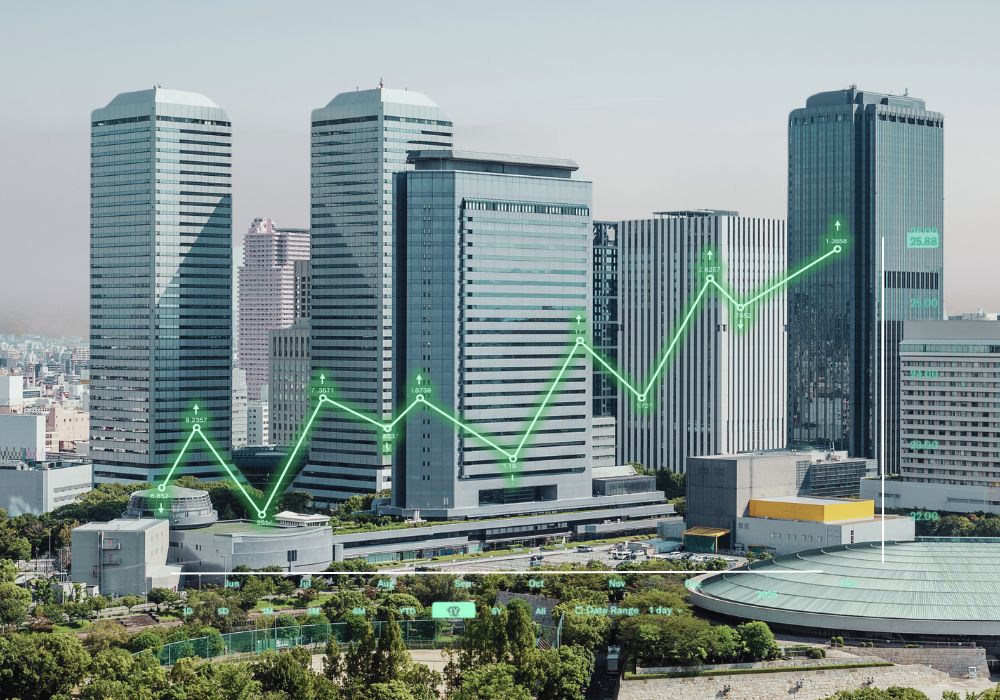For diversified investors, 2024 was a big, beautiful bull run that blew past analysts’ expectations. The Nasdaq stock exchange climbed 29% and the S&P 500 went up 23%, hoisted aloft by the seven biggest American tech companies, which together drove more than half of the overall gains.
With rapid advances sparking broad enthusiasm for artificial intelligence, and with Big Tech spending billions to build infrastructure to meet the expected demand, even going so far as to reactivate Three Mile Island, investors rode a tsunami of rising valuations and increasing returns. Everyone with index funds in their portfolio – especially those tracking indexes that include U.S. equities – benefited one way or another from the AI trend. And even though markets were recently thrown into chaos over news about potentially disruptive AI tech out of China, most observers think the gold rush in AI isn’t over.
Last year was a good one for buyers of sustainability-focused index funds, too. Exchange-traded funds were popular in general: global net inflows nearly doubled in 2024 to more than US$1 trillion. While not often outperforming the broader market, sustainable ETFs all experienced strong growth, with the “Magnificent Seven” tech companies doing the heavy lifting.
“‘Doing less evil’ sustainable funds did a great job of tracking overall returns, despite horrible things like weapons manufacturers and for-profit prisons getting a bump from Trump’s win late in the year,” says Tim Nash, the founder of Good Investing, in an email. “Fortunately, Nvidia – one of the best-performing stocks in the entire market – has a strong sustainability rating and filled the gap nicely in sustainable funds that exclude less savoury tech companies like Amazon and Meta.”
Along with Nvidia, other common tech holdings for sustainable equity funds include Apple, Tesla, Alphabet and Microsoft.
The energy sector didn’t do any favours for sustainable investors in 2024, however. “Energy stocks lagged in 2024, which benefited investors who have divested from fossil fuels. However, green energy stocks had another abysmal year, so green investors can’t be too smug,” Nash says. “Niche clean-energy ETFs were some of the worst-performing ETFs in the market.”
The challenge of comparing funds with different sustainability metrics
To implement their strategies, ETF and mutual fund managers rely on widely varying data providers with their own divergent methodologies for rating companies. The lack of a standard taxonomy for sustainable finance makes these funds uniquely hard to compare, because there are so many different approaches for deciding what stocks they should contain. For example, Corporate Knights researchers give Nvidia a low sustainability score, while others, such as the ESG rating tool by the firm MSCI, put it higher. You can read a detailed explanation of the Corporate Knights methodology here.
RELATED
Why are financial advisers shunning green funds?
The anti-ESG movement scores a victory as net-zero financial alliance unravels
Seven sustainable finance predictions for 2025
“Our taxonomy is different from others,” says Michael Yow, director of ratings at Corporate Knights. Yow’s research team takes a mostly quantitative approach, whereas other research providers use more qualitative definitions, so subjectivity can get into the investment, he says.
“We do this ranking to help investors cut through the noise and identify which funds stand above the rest when it comes to responsible investing,” says Toby Heaps, CEO of Corporate Knights, in a statement. “Our methodology meets the acid test of credibility, with 100% transparent and clear criteria for grading funds against peers according to the weighted sustainability score of their holdings.”
Here are each of the top sustainable ETFs in the four key categories used in the 2025 Responsible Funds ranking. Whether you’re looking for Canadian, U.S., international or global equity funds, these four achieved the highest sustainability level, according to the methodology used by Corporate Knights researchers.
This information is not financial advice. Speak with a professional advisor for financial planning.
| Top Four Sustainable Funds of 2025 | ||||
|---|---|---|---|---|
| Category | Fund | Manager | 1yr Return* | 3yr Return* |
| Top U.S. Equity | Invesco ESG NASDAQ 100 Index ETF (QQCE) | Invesco Canada Ltd. | 32.89% | 18.74% |
| Top Canadian Equity | RBC Vision QUBE FFF LV Canadian Equ Fd A | RBC Global Asset Management Inc. | 21% | 9.80% |
| Top International Equity | Franklin ClearBridge Sust Intl Gth Fd Ser A | Franklin Templeton Investments Corp. | 15.12% | 2.05% |
| Top Global Equity | CI MSCI World ESG Impact Index ETF (CESG) | CI Investments Inc | 0.30% | 8.20% |
* as at January 31, 2025
Top U.S. equity fund: Invesco ESG NASDAQ 100 Index ETF
This fund by Invesco Canada is an RRSP-eligible ETF (ticker: QQCE) that tracks the Nasdaq-100 ESG Index and reported an impressive 32.89% one-year return on January 31, 2025. For these higher returns, investors must be comfortable with higher risk of volatility. If you were to invest $100 in this ETF, you would pay a modest 22 cents toward management expenses.
QQCE was launched on November 15, 2021, and despite its relative youth, it has caught on with investors and already has $309 million (all amounts in Canadian dollars unless otherwise noted) in assets under management. Its top holdings are Microsoft, Apple and Nvidia. Apple ranks 69th on the Corporate Knights Global 100 ranking of the world’s must sustainable corporations. Two other G100 companies are among QQCE’s chief holdings: Tesla (#45) and Cisco (#54).
Top Canadian equity fund: RBC Vision QUBE FFF LV Canadian Equity Fd A
QUBE is an actively managed mutual fund for fossil-free investing. It uses an exclusion list based on the Carbon Underground 200 and another created with Sustainalytics. RBC Global Asset Management advertises this Canadian equity fund as a long-term investment with low-to-medium risk.
Created in 2021, this fund is weighted toward lower-risk stocks and sectors in the S&P/TSX Capped Composite Index. For example, as of December 31, 2024, the fund held 30% in financials, a lower-risk sector, and 0% in energy, a higher-risk sector.
This is an actively managed mutual fund, and for retail investors buying the Series A version, the cost to own is $1.89 per $100 invested, with a minimum investment of $500. QUBE has $188 million in assets under management, signifying ample liquidity. Its reported one-year return on January 31, 2025, was 21%, compared to 19.89% for the S&P/TSX Capped Composite Index.
Top international equity fund: Franklin ClearBridge Sust Intl Gth Fd Ser A
This is a sustainability-focused mutual fund that invests in equities issued outside the United States or Canada, and is also available as an ETF. This fund excludes fossil fuel companies and relies on ClearBridge’s proprietary ESG ratings. The managers take a “fundamental, bottom-up approach,” actively picking stocks according to their own best analysis and keeping most of their holdings in large companies. It has a medium risk rating and $314 million in assets under management.
The expenses for this actively managed mutual fund are slightly above average at 2.1%, or $2.10 for every $100 invested. Its one-year return as of December 31, 2024, was 15.12%, tracking closely with its benchmark, the MSCI EAFE Index.
“Many international stocks can be mispriced by markets, especially in the short term,” the firm wrote in a recent fund snapshot. “Active managers like ClearBridge can exploit these opportunities.”
This fund’s number one holding is SAP Software Solutions (G100 #58), a German cloud services provider with strengths in AI, whose one-year return at the time of writing was 58%, climbing from US$175.73 to $279.79. Following that is Novo Nordisk (G100 #62), a Dutch pharmaceutical giant, whose value has dropped precipitously since last summer. Schneider Electric, the first-place company on this year’s G100 ranking, is also among the fund’s top holdings.
Top global equity fund: CI MSCI World ESG Impact Index ETF
This medium-volatility ETF excludes fossil fuel companies and is available in two series, one in which exposure to foreign currency is hedged (CESG) and one that is unhedged (CESG.B), as well as a mutual fund version. It is advertised to investors who want to put their money into companies with strong environmental, social and governance (ESG) performance and “that have a positive impact on the environment and society.”
“Unlike many other ESG funds, which often hold very similar stocks to the broad market index and then apply a slight ESG tilt, CESG.B/CESG strictly screens for stocks that must meet several key impact metrics in order to be included in the fund,” a representative of CI Investments said in an email.
The total cost to invest in this low-carbon ETF is listed as 0.47% of its value, or $0.47 for every $100 invested. Created on September 12, 2019, and managed by CI Global Asset Management, this fund tracks the MSCI World ESG Select Impact ex Fossil Fuels Index. Its listed one-year return on January 31, 2025, was 0.3%, whereas its three- and five-year returns were both around 8%.
It has 72 listed holdings and its total assets under management are $61.2 million. Its current top holding is French IT company Dassault Systèmes, ranked 31 on the 2025 Global 100 list. Other G100 holdings include Ozempic-maker Novo Nordisk (#62) and the U.S. data processor and hosting provider Equinix (#72).



